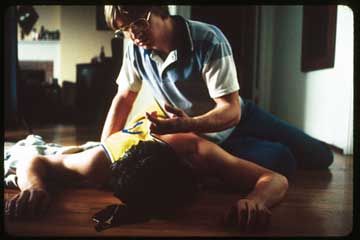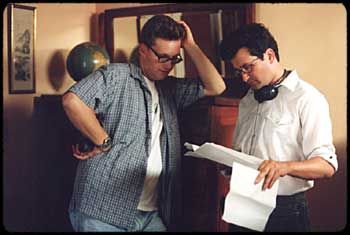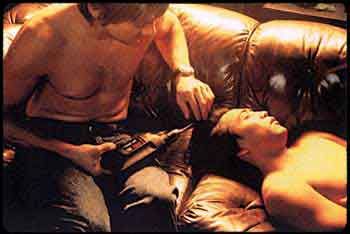DAVID JACOBSON ON BRINGING LIFE TO JEFFREY DAHMER

Released in 2002, David Jacobson's Dahmer is a haunting, harrowing and endlessly fascinating journey into the psyche of a truly twisted and irreparably disturbed mind.Anchored by a restrained, impressive performance by Jeremy Renner in the title role (who unnervingly nails the character, despite the lack of physical similarities), Jacobson tells his story by intercutting the present (just prior to Dahmer's crimes being revealed) with select scenes from his teenage years and early adulthood, which helps gives the film an appropriate sense of duality, and although it doesn't go as far as to try and explain or pinpoint the roots of Dahmer's psychosis, Jacobson does achieve the seemingly unimaginable, by eliciting a degree of sympathy for this most reviled of true-life monsters.
While we in no way excuse Dahmer for his actions, these flashback sequences powerfully demonstrate that the young Dahmer was a boy clearly in need of help, yet too scared to call out for it, and stuck in a world of parents too self-absorbed with their own problems to notice (or care) until it's far too late.


Although Renner dominates the film, Dahmer also benefits from strong performances by Artel Kayaru as Rodney (a potential victim whom Dahmer picks-up while buying a hunting knife) and Bruce Davison (best known as Senator Kelly in the X-Men films) as Jeffrey's father Lionel. Renner and Kayaru work wonderfully off each other, making good use of Jacobson's intelligent screenplay. Jacobson also uses music and lighting to great advantage, creating a strange but effective ambiance, and manages to piece together some highly effective sequences which range from the unbearably tense (Lionel demanding that Dahmer unlock an old chemistry box in front of him, which we know contains something grisly) to the almost poignant (Dahmer sitting alone in a chair at a party in his own home, while his 'friends' dance and laugh, oblivious to his presence).
Somewhat overlooked during it's initial release (heading direct to the video store shelves in many countries), Dahmer is certainly not a film for everyone, but hopefully the passage of time will place it alongside such other landmark serial killer films as Silence of the Lambs and Henry: Portrait of a Serial Killer (yes, I believe it's THAT good).

DAVID JACOBSON: DAHMER INTERVIEW
Can you start by giving us a little bit of background on yourself? Where did your interest in film and filmmaking stem from?
I have always loved movies and come from a movie-loving family. For me it was a great escape when I was growing up. I didn't like to talk to people. It was a great way to be alone. I also loved stories of anti-heroes, which there were a lot of in the seventies. It made me feel less alone to know there were other people who hated their lives.
When did the idea of doing a film on Jeffrey Dahmer first occur to you? What do you think sparked your initial interest in the project?
My initial interest in Dahmer came from reading a book about him written by his father. It was a very interesting book to me, because it told the story not from a sensationalistic, journalistic point of view, but from an emotional point of view, the point of view of a father.
I like movies that don't conform to conventional genres, that come at subjects from an unexpected angle. I also felt in the story of Dahmer some emotional themes that I have experienced in my own life. This made it very personal. I think the things he did, cannibalising, mutilation, etc. came from emotional places that exist in all of us.
I also felt that the horrifying secrets he had to bear made him utterly alone and that is also something I think we all feel to a degree.I think we all bear secrets and those secrets cut us off from others.

What did you use as the basis for your research when writing Dahmer? Was there any particular books or documentaries that you relied upon more than others for insight?
After reading the book written by Dahmer's father, I went to Milwaukee, Wisconsin where his trial took place.There I read through a 160 page police confession by Dahmer and read through hundreds of pages of psychiatric analysis by the forensic psychologists who interviewed Dahmer for his trial. This gave me most of the material in the screenplay.
I believe that you wrote the first draft of the screenplay within two weeks. Do you normally write in a frenzy like this, or was Dahmer an exception?
I rarely write that fast and even that was just a draft. I went through many more drafts after that, and thinking and discussing. The writing process for me is pretty excruciating, but I do it because it makes the project so personal to me.
How did you go about raising the finance for the film? Was their much opposition to the project, given its subject matter?
I sent the script to numerous independent producers, none of whom showed any interest. Many people were just appalled that I would want to do a film on Dahmer, especially the ones who didn't read the script. I wondered myself if it was the right thing to do. He did atrocious things to people. He treated people like objects, which to me is the worst sin you can commit.
But somehow I kept being compelled to make the film. I knew that there was something that would affect people and perhaps make them see the world a little differently that it gets presented on TV or in big budget films.
After the many rejections, I finally committed my own money to make the film and that got the ball rolling. Eventually my producer Larry Rattner found the rest of the money and we made it through production. But we did it for around 200,000 USD. One of the aspects of Dahmer that I find really works is its structure, the balance between flashbacks and the present. To me it really balances out the horror and even in some scenes a twinge of sympathy which you feel towards this character. Did you always feel during the planning and writing stages that this was the most effective method of telling the story, rather than opting for a straightforward chronological plot?
The structure was always under question from the first draft through the editing. I always had the flashbacks, but through the writing process I made them less and less expository and more narrative.
I don't like when films use flashbacks just to give some expository information to help you rationally understand the character. I always feel like that is a cheap shortcut. I also dont like films that answer all the questions for you.
The best films are like poems and allow for just as much connotation as denotation. In a sense I was just trying to weave together different parts of his life that related on an emotional level, not a rational biographical level. And I did want the audience to see him as a complicated, sick individual, not just a two-dimensional monster, or symbol of evil. The film to me has a very sparse ambiance, and makes great use of sound (something which really comes to the fore when watching the film with headphones on). Are you an admirer of David Lynch? The atmosphere of Dahmer reminds me at times of some of Lynch's early works.
I am a very big fan of David Lynch. So much so I have to constantly struggle to keep my own voice. I think most artists are inspired by other artists, in part because they articulate a similar world view, but at the same time they form your world view. So it is hard sometimes to not just mimic them.
It is so hard to find your own voice.It doesn't come naturally to me. I'm still trying to find it. I also am inspired by David Lynch's willingness to still take risks even though he has been very successful. How much room did you give the two leads to improvise? They seem to work very well together, and their on-screen chemistry certainly helps propel the film along....
We didn't do much improv in the production because there wasn't enough time, but in rehearsal we did do some.They are just both such incredible actors that they could open themselves to each other and the moment and make my writing come alive.
Critically Dahmer seems to have done quite well, and received a number of prizes at the 2003 IFP Independent Spirit Awards. How did the film fare commercially in America?
The film was self-released theatrically and therefore didn't do well at all financially, but the video was very promoted by Blockbuster video and did spectacularly for an independent film with no known celebrities in the cast.
I think the film's acceptance, after being so roundly rejected before production, will inspire me to listen to my heart and take risks.
(Note: Dahmer was released on DVD in the US by First Look Entertainment in a Special Edition that contains Director/Actor Commentary, Theatrical Trailer and a Making-Of Featurette).
FURTHER VIEWING:
JEFFREY DAHMER - THE SECRET LIFE
1992/Directed by David R. BowenLow-budget independent film put together not long after the Jeffrey Dahmer case first broke. Carl Crew not only portrays Dahmer on screen, but also wrote the screenplay (taking great liberties with the facts) and produced the project. Perhaps he should have focused on his roles behind the camera and cast someone else in the lead, as his lacklustre performance is one of the film's biggest drawbacks. Still, the film does have a certain sleazy appeal, being as it dwells more on the brutal killings than Dahmer's motivation. Released as a no-frills DVD in the US by Spectrum Entertainment in 2002. (Running Time: 100 mins. approx.)
1992/Directed by David R. BowenLow-budget independent film put together not long after the Jeffrey Dahmer case first broke. Carl Crew not only portrays Dahmer on screen, but also wrote the screenplay (taking great liberties with the facts) and produced the project. Perhaps he should have focused on his roles behind the camera and cast someone else in the lead, as his lacklustre performance is one of the film's biggest drawbacks. Still, the film does have a certain sleazy appeal, being as it dwells more on the brutal killings than Dahmer's motivation. Released as a no-frills DVD in the US by Spectrum Entertainment in 2002. (Running Time: 100 mins. approx.)
DOCUMENTARIES
Although the definitive documentary on the subject has yet to be produced, there have been a number of television specials devoted to Jeffrey Dahmer, most of them produced by American cable TV networks like A&E to fill a one-hour time slot (restricting the actual content to a mere 45-50 minutes).
Among the best of these specials are Dahmer - Mystery of the Serial Killer (1993), Jeffrey Dahmer - The Monster Within (1996) and Born to Kill: Jeffrey Dahmer and Ted Bundy (part of the 20th Century with Mike Wallace). Many of these programmes are available to purchase direct from the A&E website at: www.store.aetv.com. Dahmer - Mystery of the Serial Killer was also included on the video release Serial Killers: Profiling the Criminal mind - Volume 1.
RECOMMENDED READING:
THE JEFFREY DAHMER STORY: AN AMERICAN NIGHTMARE
by Donald A Davis
1991/St. Martin's Press/USA/Paperback/ISBN 0312928408The first Dahmer book was this quicky paperback that reads better than most, thanks to the flair of writer Davis and the sheer horror of the details of the case. Illustrated.
PSYCHO KILLERS No.5
July 1992/Comic Zone/USA/Comic BookControversial comic book series that gained notoriety and achieved respectable sales (it lasted 16 issues, not counting a number of one-shot specials), but the writing and artwork was usually more miss than hit, with minimum plot and characterisation, and often bland, uninspired layouts. Still worth picking up for its curio value.
THE SHRINE OF JEFFREY DAHMER
by Brian Masters
1993/Coronet/UK/Paperback/ISBN 034059194The best and most insightful of the Dahmer paperbacks, from the author of the Dennis Nilson study Killing for Company. Illustrated.
MURDER IN MIND No.3
1996/Marshall Cavendish/UK/MagazineWeekly serial publication with each issue (usually) devoted to a specific murder case (both famous and obscure). Originally published in 1990 as Murder Casebook, the breaking of the Dahmer and Fred & Rosemary West cases in the early-1990s no doubt spurred Marshall Cavendish on to repackage the series. This 38 page issue features a pretty good overview of Dahmer and his crimes, heavily illustrated with some rare colour and B&W photos.
MY FRIEND DAHMER: A TRUE STORY BY DERF
March 2002/Derfcity Comics/USA/Comic BookDisturbing and at times even poignant one-shot underground comic book, written and illustrated by John Backderf, who recounts his experiences as a high school classmate (and superficial friend) of Dahmer's during the late-1970s. (My interview with Backderf which appeared inHeadpress 25 will be posted here soon).
REAL-LIFE CRIMES....AND HOW THEY WERE SOLVED No.3
2003/Eaglemoss Publications/UK/MagazineAnother limited weekly publication, in a similiar vein to Murder In Mind but not as thorough, with each issue given over to covering several different crimes.
Interview & Article Copyright John Harrison
(This article originally appeared in a slightly different form in Volume 2 of the UK Headpress publication Creeping Flesh)

